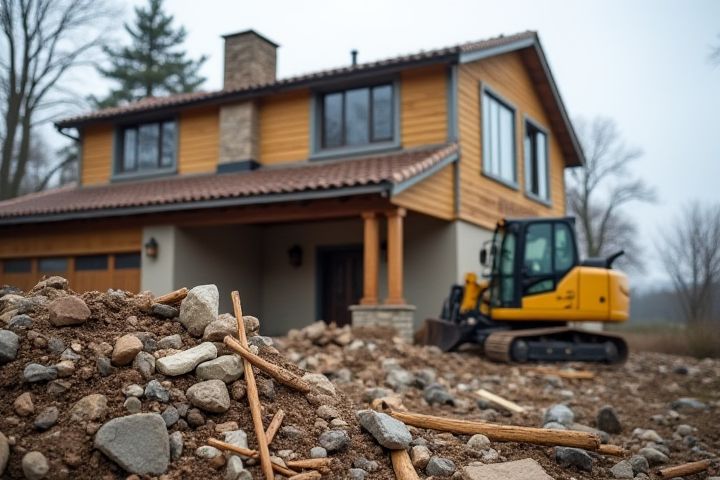
To demolish a house legally, you must first acquire the necessary permits from your local municipality, which are essential to ensure compliance with zoning laws and safety regulations. A structural assessment may be required to confirm whether the building is safe for demolition and to identify any hazardous materials, such as asbestos, that must be handled appropriately. You should also check if the property is located in a historic district, as additional regulations could apply to protect the site's historical integrity. After obtaining all required approvals, hiring a licensed demolition contractor is advisable, as they possess the expertise in safely executing the demolition process. Ensure that all utilities, including water, gas, and electricity, are disconnected before beginning the demolition to prevent any accidents or legal complications.
Can I Demolish A House Legally
Ownership rights
You can legally demolish a house if you hold the ownership rights, which typically include the title and deed to the property. However, it's essential to check local zoning laws and building codes that may require permits for demolition. Any existing liens or easements on the property may also affect your ability to proceed. Consulting with a real estate attorney can provide clarity on your specific ownership rights and any legal obligations you must fulfill before demolishing the structure.
Local zoning laws
To legally demolish a house, you must first adhere to local zoning laws that govern property use and alteration. These regulations vary by municipality but often require special permits or approvals before demolition can take place. You may need to conduct an environmental assessment and notify neighbors or local authorities about the impending demolition. It's crucial to consult with your city's planning department to ensure compliance with all zoning regulations and avoid potential fines or legal complications.
Demolition permits
To legally demolish a house, obtaining a demolition permit is essential. Local government agencies typically require you to submit an application that includes detailed plans for the demolition process, potential environmental impacts, and safety measures. You might also need to conduct an environmental assessment, especially if the structure contains hazardous materials like asbestos. It's crucial to check your municipality's regulations, as compliance with local codes ensures that you avoid fines and legal complications during and after the demolition.
Environmental regulations
To legally demolish a house, you must adhere to various environmental regulations that ensure proper waste management and the protection of local ecosystems. This often involves securing a permit from local authorities and conducting an environmental assessment to identify hazardous materials, such as asbestos or lead paint, that require careful handling. You may also need to follow specific procedures for the disposal of demolition debris to minimize landfill impact and facilitate recycling opportunities. Ensure that your demolition practices align with state and federal laws to avoid fines and promote sustainability.
Utility disconnections
Before demolishing a house, ensure that all utility disconnections are properly arranged to avoid legal complications. Contact your local utility providers to schedule the termination of services such as electricity, water, gas, and sewage. Obtain the necessary permits from your local government or building authority, as failure to do so could lead to fines or delays in the demolition process. Proper documentation of utility disconnections will also help maintain compliance with safety regulations during the demolition.
Heritage preservation
To legally demolish a house with historical significance, you must first assess its status under local heritage preservation regulations. Many jurisdictions require a permit or adhere to strict guidelines before any demolition, especially for properties on historic registers. Engaging with local preservation boards or organizations can provide necessary insight and approvals, as they may advocate for restoration over demolition. You should also consider potential penalties for unauthorized demolition, emphasizing the importance of compliance with heritage preservation laws in your area.
Asbestos and hazardous materials
Before demolishing a house, it is crucial to assess the presence of asbestos and other hazardous materials, as improper handling can result in serious legal and health repercussions. You must conduct a thorough inspection by a licensed professional to identify any hazardous substances, as local regulations often require this step before any demolition permits are granted. Your next step is to ensure that any asbestos removal or hazardous material abatement is performed by certified contractors, as mandated by environmental laws. Compliance with these regulations not only safeguards your health but also protects you from potential fines and legal liabilities associated with improper disposal.
Contractor licensing
To legally demolish a house, you must ensure that your contractor is licensed and compliant with local regulations. Most states require demolition contractors to possess specific licenses, which demonstrate their knowledge of safety protocols and environmental regulations. Verify that the contractor you choose holds the necessary state or local licenses, which may include general contractor licenses and specialized demolition permits. Additionally, check for insurance coverage and bonding, which protect you from potential liabilities during the demolition process.
Neighbor notification
Before demolishing a house, it is crucial to notify your neighbors, as local regulations often require this step. Informing them allows for any concerns regarding safety, noise, or debris management to be addressed. Typically, municipalities have specific guidelines on how far in advance neighbors must be notified, often ranging from a few days to several weeks. Ensuring you follow these requirements not only fosters good relationships but also safeguards you against potential legal disputes or fines.
Debris disposal regulations
To legally demolish a house, you must comply with local debris disposal regulations, which often require obtaining necessary permits from your city or municipality. Most areas mandate that you separate hazardous materials, such as asbestos or lead paint, from non-hazardous debris to ensure safe disposal. You may need to hire a licensed waste disposal contractor who adheres to the Environmental Protection Agency (EPA) standards, aiming for at least 75% of demolition debris to be recycled or reused. Always check local laws, as fines can exceed thousands of dollars for improper disposal practices.
